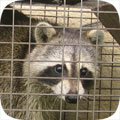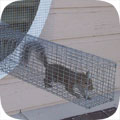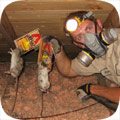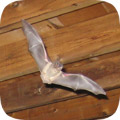- leesburg@wildlifeanimalcontrol.com
Call 24/7 for a free quote:
703-939-9551
Leesburg Wildlife Animal Control
Professional Wildlife Removal Company Servicing Leesburg, VA
If you have a problem with wildlife in your Leesburg home, your best option is to hire a company that specializes in Virginia wildlife removal only. This is a specialty business, and regular pest control companies do not use the proper techniques to solve animal problems. I have spent many years reviewing Virginia and Leesburg, and I recommend the following:
EnviroGuard Solution
Cell Phone: 703-939-9551
NOTE: If you have a dog or cat problem, call Loudoun County Animal Services: 703-830-1100

EnviroGuard Solution specializes primarily in removing animals from attics of homes and buildings - this includes squirrels in attics, raccoons, and rats or mice in homes. Virginia also has a documented problem with
bats in buildings, and EnviroGuard Solution is specially trained in bat removal. They also perform general wildlife trapping services, such as the capture and removal of skunks or opossums on the
property. Call 703-939-9551 to discuss your critter problem and schedule a same-day or next-day appointment. Click here to learn more about
what prices we charge in 2024.
When hiring a company to solve your wild animal problem, you want these features:
- Specializes in wildlife removal, not pest control
- Fully Virginia and Loudoun County licensed and insured
- Works 7 days per week (critters don't take weekends off)
- Performs full building inspections: enters and inspects attic
- Performs exclusion repairs, with guarantee against animal re-entry
- Offers cleanup of biohazardous wildlife waste
EnviroGuard Solution is a full-service Leesburg wildlife removal company. This is very different from a regular Leesburg pest control company. The pest control companies spray poison to kill insects. This is not at all
similar to wildlife removal. EnviroGuard Solution performs a full inspection of the home or property, and determines why the animal(s) are there, and if inside a building, how the animals got inside. All
animals (including rodents) are trapped and removed, or if possible, removed from the building using special exclusion devices. Once the animals are gone, preventative repairs are essential, and
cleanup is sometimes recommended.
 Leesburg wildlife trapping - it's not as simple as it may seem. It's illegal in Virginia to trap without a license. Trap type is very important and there are many different types, bait is somewhat relevant, trap placement
is vital, and there are dozens of small things that are very important to know.
Safety is a concern. Then once the animal is trapped, it must be removed and dealt with in the proper manner according to Virginia law. We offer Leesburg raccoon removal. Read more about how to get rid of raccoons.
Leesburg wildlife trapping - it's not as simple as it may seem. It's illegal in Virginia to trap without a license. Trap type is very important and there are many different types, bait is somewhat relevant, trap placement
is vital, and there are dozens of small things that are very important to know.
Safety is a concern. Then once the animal is trapped, it must be removed and dealt with in the proper manner according to Virginia law. We offer Leesburg raccoon removal. Read more about how to get rid of raccoons.
 Animals in attics - this is our specialty at EnviroGuard Solution. Many types of animals like to live in attics. This includes squirrels, raccoons, rats, mice, bats, birds, and even possums. Critters like to go into attics for a safe place to live
and raise their young. Removing animals from attics is very complex work, partly because of the presence of baby animals. If you need Leesburg squirrel removal, we can remove all the squirrels from your attic, and seal out any future ones. Read more about how to get rid of squirrels.
Animals in attics - this is our specialty at EnviroGuard Solution. Many types of animals like to live in attics. This includes squirrels, raccoons, rats, mice, bats, birds, and even possums. Critters like to go into attics for a safe place to live
and raise their young. Removing animals from attics is very complex work, partly because of the presence of baby animals. If you need Leesburg squirrel removal, we can remove all the squirrels from your attic, and seal out any future ones. Read more about how to get rid of squirrels.
 Rodent control must be done in a very specific way. First off, the most important thing is that all the openings that rats and mice can use to enter a house be sealed. Then all the rodents must be physically trapped and removed.
Never, ever use poison! Most Leesburg exterminators will just use this lazy poison technique to kill rodents, and it causes more harm than good - dead stinky rats, and it doesn't solve the problem. Call us for correct Leesburg rat removal. Read more about how to get rid of rats.
Rodent control must be done in a very specific way. First off, the most important thing is that all the openings that rats and mice can use to enter a house be sealed. Then all the rodents must be physically trapped and removed.
Never, ever use poison! Most Leesburg exterminators will just use this lazy poison technique to kill rodents, and it causes more harm than good - dead stinky rats, and it doesn't solve the problem. Call us for correct Leesburg rat removal. Read more about how to get rid of rats.
 Bat removal is a highly specialized task. Virginia is known to have colonizing bats who often live in buildings. Bats love attics. If not removed, the colony can grow to a very large size over the years. The bat droppings are often corrosive and
cause health risks. The same goes for bird droppings on or in buildings. We perform Leesburg pigeon removal and bird control. But our specialty is Leesburg bat removal. We remove 100% of the bat colony and seal the building so that it's totally bat-proof. Read more about how to get rid of bats.
Bat removal is a highly specialized task. Virginia is known to have colonizing bats who often live in buildings. Bats love attics. If not removed, the colony can grow to a very large size over the years. The bat droppings are often corrosive and
cause health risks. The same goes for bird droppings on or in buildings. We perform Leesburg pigeon removal and bird control. But our specialty is Leesburg bat removal. We remove 100% of the bat colony and seal the building so that it's totally bat-proof. Read more about how to get rid of bats.
 If you have animals inside a house, no job is complete without proper exclusion repairs. If you simply hire a Leesburg trapper who only removes the critters, then the problem will return. You need to hire a Leesburg wildlife control company that identifies 100% of the animal entry points
into your building, and seals them shut with professional repairs. In addition, in many cases animals have left waste or contamination behind, and you'll want a company that can provide professional cleaning services. EnviroGuard Solution does both.
If you have animals inside a house, no job is complete without proper exclusion repairs. If you simply hire a Leesburg trapper who only removes the critters, then the problem will return. You need to hire a Leesburg wildlife control company that identifies 100% of the animal entry points
into your building, and seals them shut with professional repairs. In addition, in many cases animals have left waste or contamination behind, and you'll want a company that can provide professional cleaning services. EnviroGuard Solution does both.
The above are just some of the services offered by EnviroGuard Solution. We also trap and remove animals that destroy lawns, such as moles, or digging animals. Sometimes animals like opossums will live under buildings, steal pet food, raid garbage cans, etc.
Read about how to get rid of opossums. Skunks commonly live under sheds or decks, and set up a den. We can trap and remove them without them spraying. Read about how to get rid of skunks. EnviroGuard Solution
also provides dead animal removal in Leesburg. If you need help with any other wildlife conflict, from a fox, beaver, groundhog, or any other critter, we can solve it. We also do Leesburg snake removal - most of the snakes in Virginia are not venomous, but
call us if you want safe removal, or read about how to get rid of snakes in Leesburg. And remember, we are a private business, not Loudoun County Animal Control Services, so if you have a dog or cat problem, call the County at 703-830-1100.
Loudoun County animal services does not handle any wildlife issues.
EnviroGuard Solution
Cell Phone: 703-939-9551
Leesburg Pricing Info
Every wildlife removal situation is different, from the species of animals involved, the location of the animal inside a house or outside, the extent of repairs or cleanup, etc. It's impossible to give one-size-fits-all prices. Examples MIGHT include:Small Job: For example, a one-stop job to remove an animal in the yard: $100 on up
Medium Job: For example, getting critters out of your house with minor repairs: $300 on up
Large Job: For example, a project involving many service trips and complex work: $500 on up
Give us a phone call now and tell us about your wildlife issue and we will be able to give you a price estimate over the phone. If you're cool with it, we can schedule a same-day or next-day appointment if you like. Our prices are fair, and a good value because we do the job right, the first time.
Leesburg Wildlife Tip #1:
Can Raccoons Get Through Walls?
Raccoons are commonly found in many places inside the house - walls, attics, ceilings, etc. These animals find and reside in such places especially to have babies since the place is safe and warm and provides protection.
So, to answer the above question if raccoons can get through walls, the answer is yes and no. Sure, raccoons do reside in walls. They will get through openings and crevices and large enough cracks in walls. They squeeze through and find shelter in walls, but they cannot dig their way in or out of walls.
In modern built homes, there is usually a gap between the exterior and interior wall which serves as a soundproof layer and even acts as an insulator. Sometimes it is stuffed with material like cellulose fiber so as to provide extra insulation from the cold during the winter seasons. This is an ideal place for the raccoon to hide out and even give birth to babies. It could be a menace.
How do you know if a raccoon is in the walls?
The major signs of raccoons being in walls are the scratching sounds they make. Another dead giveaway is the smell of their urine that is so consistent. Sometimes, when the raccoon gets too comfortable in the place where it is hiding between the walls, it begins to defecate there. Its urine, being strong in nitrogenous wastes can weaken walls and woody layers over a period of time. With sufficient effort, it can make a hole in the wall so as to escape, though it can never "dig" a hole.
There are many ways for the raccoon to get out, just the way it got in, unless you have sealed the opening from which it entered. Under any given circumstance, it cannot dig a hole through a wall to get out with its babies.
Once you find that a raccoon is stuck in your wall, do get help, preferably professional help at the earliest, since raccoon, like other rodents do transmit diseases and could contain harmful pathogens that are not friendly towards humans. It is also known that some spores are given out along with the other nitrogenous waste and these spores can be disease causing and it is especially dangerous if there are young children or old people at home.
The most common reason why a raccoon can get stuck in the wall is because once they squeeze through the wall, they might not have the required energy to climb back up to squeeze out again. The opening may be higher than the distance that the raccoon can climb. Another reason why the raccoon may prefer to be stranded is that, it has babies. It may not want to risk coming out if the babies are not grown enough to leave the "nest".
If you intend to remove the raccoon yourself, be sure to make sure that you take the necessary precautions to prevent yourself from taking risks. If you are doubtful about hurting yourself or the raccoon, it is the best option to call in a professional who can easily get the job done within a few minutes.
Leesburg Wildlife Tip #2:
Virginia Wildlife Information:
Virginia State bird: Northern cardinal
State mammal: Virginia big-eared bat
State fish: Brook trout, striped bass
State insect: Tiger swallowtail butterfly
Virginia is attached to the Chesapeake Bay, and because of this, it has a large coastal plain that extends inland, passing the bay's tributaries and eventually ending at the swelling of rocky foothills. Those foothills spread into the Blue Ridge Mountains, an extension of the Appalachian range. The state has an abundance of carbonated rock which has led to the creation of thousands of cave systems. Ten of those systems are currently open to the public, leaving about 3,990 on private land or currently uncharted. Along with the caves comes a variety of bat species, including the big brown bat, Brazilian free-tailed bat, eastern red bat, evening bat, gray bat, and the hoary bat, to name a few. Caves are the perfect habitat for these animals, which can either migrate or hibernate in the colder months. While Virginia is not prone to particularly harsh winters, the cave systems make a good, temperature-controlled place for hibernation.
Bats, though numerous, are only a small portion of the animal population in Virginia. The state has a number of predators including black bears, bobcats, cougars, and coyotes. This state doesn't have huge issues with the larger predators mainly because of how mountainous and wild the habitat has remained. The coastal plain is much more covered in people's homes, and this is where critters like squirrels and raccoons love to play. Because of the amount of trees in this state, it doesn't take long for a vertical-loving animal to find a way into a house. While raccoons and squirrels are definitely on the list of nuisance animals, they are among a score of others including woodchucks, skunks, porcupines, and opossums.
The state is also perfect for birds, and Virginia has a population of golden eagles, a large avian that tends to live in isolated settings across the globe. Not much research has been done on the golden eagle, and Virginia wildlife authorities hope they can study the growing population and shed some light on the species.
The fresh water feeding into the Chesapeake Bay provides a good ecosystem for amphibians and reptiles, and Virginia has a number of water-loving snakes including the cottonmouth and the common water snake. The state also has glass lizards, a snake-like creature, and the only limbless lizard in the United States.
You can always call EnviroGuard Solution, any time of day, at 703-939-9551, for a price quote for Leesburg wildlife control services. I am confident that this is the best choice amongst wildlife removal companies in Leesburg, VA.







































